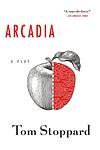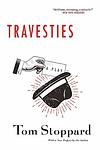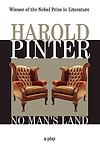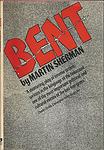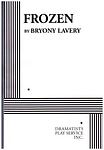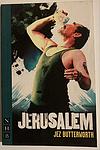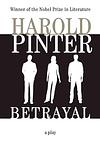The Greatest British "Plays, Fiction" Books Since 1970
Click to learn how this list is calculated.
This list represents a comprehensive and trusted collection of the greatest books. Developed through a specialized algorithm, it brings together 290 'best of' book lists to form a definitive guide to the world's most acclaimed books. For those interested in how these books are chosen, additional details can be found on the rankings page.
Genres
Plays are a category of literature that consists of written works intended for performance on stage. They typically feature dialogue between characters and are structured into acts and scenes. Plays can be comedic, tragic, or a combination of both, and often explore themes such as love, power, and morality. They are meant to be performed by actors in front of an audience, and can be enjoyed both as written works and as live performances.
Countries
Date Range
Reading Statistics
Click the button below to see how many of these books you've read!
Download
If you're interested in downloading this list as a CSV file for use in a spreadsheet application, you can easily do so by clicking the button below. Please note that to ensure a manageable file size and faster download, the CSV will include details for only the first 500 books.
Download-
1. Arcadia by Tom Stoppard
"Arcadia" is a play that intertwines two timelines, set in the same English country house but centuries apart. In the early 19th century, a gifted young girl and her tutor delve into intellectual pursuits, exploring mathematics, nature, and the early inklings of chaos theory, while around them, the adults engage in witty repartee, romantic entanglements, and poetic rivalries. In the present day, scholars and descendants of the house's historical residents attempt to piece together the past, often misinterpreting the evidence they find. The play explores themes of time, truth, and the impact of the past on the present, all while showcasing the enduring nature of human curiosity and the quest for knowledge.
-
2. Travesties by Tom Stoppard
The play is a comedic and intellectual romp through Zurich during World War I, where the lives of historical figures like the Dadaist Tristan Tzara, the novelist James Joyce, and the communist revolutionary Lenin intersect through the unreliable memories of British consular official Henry Carr. The narrative is a playful, non-linear exploration of art, politics, and the nature of memory, blending slapstick humor with sharp wit and literary allusions. The work challenges the audience to consider the role of the artist in society and the impact of political upheaval on cultural expression, all while questioning the reliability of history and the very nature of truth itself.
-
3. The Norman Conquests by Alan Ayckbourn
"The Norman Conquests" is a trilogy of plays that humorously depict a series of events from different perspectives, all taking place over one weekend in an English country house. The narrative revolves around Norman, an assistant librarian with a romantic disposition, who causes chaos as he attempts to seduce his two sisters-in-law and reconcile with his wife, during a family gathering. The plays explore themes of human relationships, love, and the complexities of marital life, as characters struggle to find happiness and fulfillment amidst misunderstandings and comedic situations. Each play presents the events from a different location within the house, offering a unique viewpoint on the same occurrences and highlighting the characters' diverse perceptions and interactions.
-
4. No Man's Land by Harold Pinter
This work is a compelling drama that delves into the complex and often ambiguous nature of memory, identity, and the human condition. Set in a single room, the play unfolds through the interactions between two men, Hirst and Spooner, who meet in a London pub and continue their encounter at Hirst's upscale home. As the evening progresses, their conversation becomes increasingly enigmatic, revealing layers of manipulation, power dynamics, and the fragility of their pasts. The presence of two other characters, Briggs and Foster, adds to the tension and mystery, leaving audiences to ponder the realities of the characters' lives and the truths buried in their stories. The play is a masterful exploration of language, silence, and the spaces between people, showcasing the playwright's signature blend of wit, irony, and emotional depth.
-
5. Noises Off by Michael Frayn
The book in question is a comedic narrative that takes readers behind the scenes of a chaotic and farcical theatrical production. It humorously details the mishaps, misunderstandings, and mayhem that ensue both on and offstage as a cast of eccentric actors attempts to present a play to their audience. With a play-within-a-play structure, the book provides a satirical look at the world of theater, showcasing the fragile egos, romantic entanglements, and technical disasters that can collide with disastrous and hilarious results. As the characters scramble to keep their performance from falling apart, the line between their on-stage roles and off-stage lives blurs, creating a whirlwind of slapstick and comedic timing that has delighted readers and audiences alike.
-
6. Old Times by Harold Pinter
The play delves into the complexities of memory and the power dynamics within relationships. Set in a converted farmhouse, a married couple hosts an old friend who shares a past with the wife. As the trio reminisce over old times, the conversation becomes a subtle battle of wits and control, revealing conflicting versions of past events. The dialogue blurs the lines between truth and illusion, exposing the characters' desires, jealousies, and the elusive nature of memory itself. The tension escalates as the characters vie to shape the narrative of their shared history, leading to an ambiguous and thought-provoking conclusion.
-
7. The Fool by Edward Bond
"The Fool" is a dramatic exploration of the life and times of a historical figure, an 18th-century English poet known for his madness and prophetic visions. Set against the backdrop of the harsh rural landscape and the onset of the Industrial Revolution, the play delves into the poet's tragic life, his struggles with mental illness, and the societal pressures that both inspire and torment him. The narrative weaves a poignant commentary on the nature of genius, the exploitation of the poor, and the destructive consequences of progress, as it portrays the poet's descent into despair and the ultimate cost of his sensitivity to the cruelties of his era.
-
8. Bent by Martin Sherman
The play is a harrowing and emotional journey through the persecution of homosexuals during the Nazi regime, focusing on the story of a gay man in 1930s Berlin who is sent to a concentration camp. His struggle for survival becomes both a testament to the human spirit and a poignant commentary on the horrors of the Holocaust, as well as the additional suffering faced by those targeted for their sexuality. Through his relationships and experiences in the camp, the protagonist grapples with identity, love, and the meaning of humanity in the face of overwhelming brutality and oppression.
-
9. The Complete Plays by Joe Orton
"The Complete Plays" is a collection of darkly humorous and satirical works by a renowned 20th-century playwright, known for his subversive take on social norms and institutions. The plays within this anthology challenge the boundaries of conventional theater, blending elements of farce and black comedy to critique the hypocrisies of society. The characters often find themselves in absurd and scandalous situations, reflecting the playwright's interest in the themes of sexuality, authority, and the fluidity of identity. With a sharp wit and a flair for dialogue, the plays remain influential, highlighting the enduring power of satire in the dramatic arts.
-
10. Copenhagen by Michael Frayn
"Copenhagen" is a thought-provoking play that delves into the historical meeting between two prominent physicists during World War II. Set as a posthumous reimagining, it explores the complex relationship between the two men, their discussions on nuclear physics, and the moral implications of their work on atomic weapons. The narrative structure blurs the lines between past and present, as the characters attempt to unravel their motivations and the potential consequences of their actions, against the backdrop of a Europe engulfed in conflict. The play raises deep questions about science, ethics, and the elusive nature of memory and human interaction.
-
11. Our Country’s Good by Timberlake Wertenbaker
Set in the late 18th century, the narrative revolves around a group of British convicts and their naval officers sent to an Australian penal colony. Amidst the harsh conditions, an ambitious young lieutenant decides to put on a play with the convicts as a means to rehabilitate them and raise morale. The story explores themes of redemption, the transformative power of art, and the complexities of the human condition as the convicts rehearse and navigate their personal struggles, social dynamics, and the rigid class structures imposed by their captors. The play within the book becomes a catalyst for change, challenging the characters' perceptions of punishment, civilization, and what it means to be a 'good' person in a society that has branded them as outcasts.
-
12. Blasted by Sarah Kane
"Blasted" is a controversial and provocative play that explores themes of violence, war, and human suffering. Set initially in a luxurious hotel room, the narrative follows a middle-aged journalist and a young woman as their seemingly private encounter is violently disrupted by the intrusion of a soldier and the horrors of an unnamed war. The play's graphic depiction of physical and sexual violence, as well as its bleak examination of the darkest aspects of human nature, has made it a seminal work in the in-yer-face theatre genre, challenging audiences with its raw, unflinching portrayal of brutality and despair.
-
13. Frozen by Bryony Lavery
"Frozen" is a gripping play that intertwines the lives of three individuals: a grieving mother whose daughter has been abducted and murdered, the serial killer responsible for the crime, and a psychiatrist researching the nature of such evil. The narrative explores themes of forgiveness, justice, and the psychological depths of crime, as it follows the mother's struggle to deal with her loss and the killer's journey through imprisonment and psychological evaluation. The play delves into the complexities of the human psyche and the possibility of redemption, challenging the audience to confront uncomfortable questions about morality, retribution, and the capacity for change.
-
14. Far Away by Caryl Churchill
"Far Away" is a dystopian drama that unfolds through a series of vignettes, revealing a world where everything in nature is at war. It begins with a young girl visiting her aunt, who discovers a disturbing secret that sets the tone for the play. As the narrative progresses, it becomes clear that the conflict is all-encompassing, with humans, animals, and even the elements themselves engaged in a relentless battle. The play examines themes of complicity, the blurring of moral boundaries, and the desensitizing effects of a world engulfed in perpetual conflict, all while questioning the nature of art, justice, and human responsibility in a society where the lines between right and wrong have been irrevocably blurred.
-
15. The Real Thing by Tom Stoppard
"The Real Thing" is a play that explores the complexities of love, fidelity, and the blurred lines between life and art. It follows the story of Henry, a witty and cynical playwright, whose intellectual prowess masks his emotional insecurities. As the narrative unfolds, Henry's relationships with his wife, his mistress, and his friends are tested, revealing the struggles and contradictions inherent in his quest for authentic emotion. The play delves into themes of intellectual honesty, the nature of reality versus appearance, and the challenge of distinguishing genuine feelings from their artistic representations, all while showcasing the characters' sharp dialogue and introspective moments.
-
16. Top Girls by Caryl Churchill
The play explores the challenges faced by women in the corporate world and society at large through the story of Marlene, a career-driven woman who has just been promoted to managing director at the Top Girls Employment Agency. The narrative delves into themes of feminism, class, and societal expectations as Marlene's success is juxtaposed with the lives of various historical and fictional women, who appear in a surreal dinner party scene, and the experiences of her own family, particularly her sister and her niece. The play critically examines the cost of Marlene's ambition and the sacrifices made by women who strive to break the glass ceiling, questioning the notion of what it means to be a "top girl" in a male-dominated world.
-
17. The History Boys by Alan Bennett
The book is a captivating exploration of a group of bright, yet unruly British schoolboys vying for a place at Oxford or Cambridge under the guidance of three contrasting teachers: the charismatic Hector, the pragmatic Mrs. Lintott, and the ambitious newcomer Irwin. Set in the 1980s, it delves into themes of education, history, and sexuality, as the boys and their educators navigate the complexities of knowledge and morality. Through witty dialogue and poignant moments, the narrative challenges conventional notions of education and success, while examining the impact that teachers have on shaping young minds and the often-unpredictable directions life can take.
-
18. An Oak Tree by Tim Crouch
"An Oak Tree" is a unique and avant-garde play that explores themes of loss, perception, and the power of suggestion through an unconventional narrative structure. The story revolves around two main characters: a hypnotist who is grappling with the guilt of having accidentally killed a girl with his car, and the girl's father, who is seeking closure. In a compelling twist, the father is played by a different actor in each performance, who has not seen the script and is guided through the play by the hypnotist. This innovative approach results in a dynamic and interactive theatrical experience that challenges the audience's understanding of reality and fiction, as the lines between actor and character, and between the play and the play within the play, become intriguingly blurred.
-
19. Jerusalem by Jez Butterworth
"Jerusalem" is a contemporary play set in the English countryside, which vividly captures the spirit of an eccentric local daredevil, Johnny "Rooster" Byron, on St. George's Day. The story delves into the tensions between the modern world and old English folklore, as Rooster, a defiant and charismatic outsider, tells outlandish tales and provides sanctuary to the town's youth against the encroaching forces of authority and gentrification. The narrative unfolds with a mix of humor and tragedy, exploring themes of national identity, social change, and the erosion of rural traditions in the face of progress and conformity.
-
20. Cloud 9 by Caryl Churchill
"Cloud 9" is a provocative play that explores themes of sexual politics and colonial oppression through a non-linear structure and gender-bending characters. The two-act play juxtaposes the Victorian era with the late 20th century, challenging societal norms and expectations. In the first act, set in colonial Africa, characters grapple with the constraints of their roles within the rigid British Empire, while the second act, set in London, shows the same characters only 25 years later, despite a century having passed, dealing with the fallout of their past and the complexities of their identities in a more modern world. The play uses role reversal and time shifts to question power dynamics and the nature of liberation.
-
21. One Man, Two Guvnors by Richard Bean
Set in 1960s Brighton, the play is a hilarious farce that follows the bumbling and perpetually hungry Francis Henshall, who becomes separately employed by two men – Roscoe Crabbe, a local gangster, and Stanley Stubbers, an upper-class criminal. Unbeknownst to Francis, Roscoe is actually Roscoe's sister Rachel in disguise, her twin brother having been killed by her boyfriend, who is none other than Stanley Stubbers. As Francis tries to keep each of his guvnors unaware of the other, he becomes entangled in a web of deception, love triangles, and mistaken identities, leading to a series of comedic mishaps and slapstick humor as he struggles to satisfy his insatiable appetite and keep his dual employment a secret.
-
22. The Effect by Lucy Prebble
"The Effect" is a thought-provoking play that delves into the complexities of the human mind and the nature of love. Set within the controlled environment of a clinical drug trial, two young volunteers find themselves drawn to each other as they partake in an experiment for a new antidepressant. As their doses increase, so does their connection, leading to passionate romance. However, the play challenges the audience to question whether their feelings are genuine or merely induced by the chemicals they are ingesting. The narrative explores themes of mental health, the ethics of pharmaceutical testing, and the essence of emotional experience, blurring the lines between reality and the side effects of medication.
-
23. Betrayal by Harold Pinter
"Betrayal" is a play that explores the complexities of human relationships through a reverse chronological narrative, focusing on a love triangle among the central characters. The story delves into the intricate dynamics of infidelity, friendship, and deceit, as it unfolds the emotional and psychological consequences of a long-term extramarital affair between the wife and the best friend of her husband. The play dissects themes of loyalty, trust, and the passage of time, revealing the characters' inner struggles and the ultimate impact of their deceitful actions on their lives and relationships.
-
24. Amadeus by Peter Shaffer
The play explores the tumultuous life of a young musical genius, as seen through the envious eyes of his less-talented contemporary. Set in the opulent world of 18th-century Vienna, the story delves into the bitter rivalry between the established court composer and the prodigious newcomer who threatens to overshadow him. As the older composer recounts his efforts to undermine the young virtuoso's career, a complex narrative of obsession, intrigue, and madness unfolds, culminating in a haunting examination of the price of genius and the destructive nature of jealousy.
-
25. Bingo by Edward Bond
"Bingo" is a play that delves into the complex and tumultuous final days of a renowned English playwright during the 16th century. As he grapples with his waning creativity, the protagonist is also confronted with the harsh realities of enclosures and the suffering of the common people. The narrative weaves through themes of power, greed, and social injustice, juxtaposing the personal turmoil of the writer with the broader socio-political conflicts of the era. The play presents a stark and introspective examination of the human condition and the moral compromises that often accompany the pursuit of wealth and status.
Reading Statistics
Click the button below to see how many of these books you've read!
Download
If you're interested in downloading this list as a CSV file for use in a spreadsheet application, you can easily do so by clicking the button below. Please note that to ensure a manageable file size and faster download, the CSV will include details for only the first 500 books.
Download